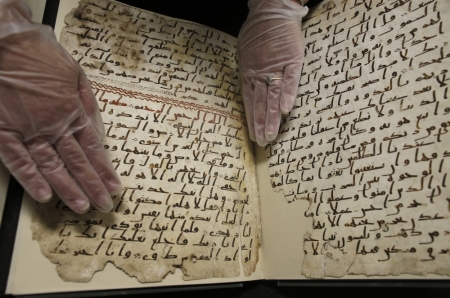Passages of Bible's Deuteronomy Found Hidden Behind 8th Century Islamic Quran

Fragments of the Bible have been discovered for the first time ever hidden behind an eighth century Quran, or Islamic holy text, a French scholar has revealed.
Eléonore Cellard of the College de France told The Guardian in an article posted on Wednesday that she was looking through London auction house Christie's latest catalog when she came about the ancient Quran, which is from the second century of Islam's existence.
When she looked closer at the Arabic manuscript, she noticed that there were actually Coptic letters faintly appearing behind the writing. A follow-up analysis found that the Coptic text was part of the Old Testament's book of Deuteronomy, though the exact verses have not yet been made known.
"This is a very important discovery for the history of the Quran and early Islam. We have here a witness of cultural interactions between different religious communities," said Cellard, who has an expertise in textual criticism.
Christie's specialist Romain Pingannaud, who helped identify the biblical text, called the find "extraordinary."
"Once you know it's there, you can only see it, it becomes so obvious. We missed it at the beginning. It's fascinating, particularly because it's the only example where you have an Arabic text on top of a non-Arabic text," Pingannaud added.
"And what's even more fascinating is it's on top of passages from the Old Testament. ... It shows the contact between communities in the first centuries of Islam; it's very relevant."
Pingannaud said that it's difficult to pinpoint how long before the eighth century Quran the Coptic text composed but suggested it's unlikely to be older than the seventh century.
"Carbon 14 testing would date only the material, not the writing, but it's quite destructive and these folios are too thin," he explained.
The fragments, which will go on sale for a minimum of $111,000 USD on Thursday at Christie's auction, are said to have been produced in Egypt, which is home to the ancient Coptic community.
A number of Coptic texts have provided important reflections on early Christianity. Last week, LiveScience reported that a 1,500-year-old "magical papyrus" discovered near a pyramid in Egypt has been deciphered, with the Coptic text issuing a plea from an unnamed writer.
"God of Seth, God of Abraham, God of Isaac, God of Jacob, God of Israel, watch over everyone who suffers. My word, may it come to pass with power," the text reads.
"May every spirit that is in the air obey me," it adds.
Oxford University researcher Michael Zellmann-Rohrer noted that the papyrus also calls the biblical God on a number of occasions "the one who presides over the mountain of the murderer," referring to the account in the book of Genesis when God initially asks Abraham to sacrifice his son, Isaac, on Mount Moriah.
Although in the biblical narrative Isaac is spared and a ram is sacrificed instead, the researcher noted that the papyrus describes the story as if the son's sacrifice actually took place, suggesting such a belief might have been widespread at the time.





















